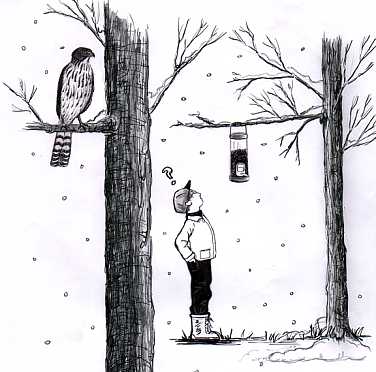
Dear Bird Folks,
For the past few weeks I have had almost no birds coming to my feeders. We always get tons of birds. Has somethng happened to them?
Tim, Chatham
No Offense, Tim,
But every December we get this question about 600 times a day. And every December I write about it, but either no one is reading this or whoever does read this, quickly forgets what I’ve written. Either way, I’m a little hurt. However, for you, Tim, I’ll answer this question one more time. Just do me a favor, please but this answer out and stick it on your refrigerator. Or better yet, tape it to your forehead so when the next person asks me, I can simply point them in your direction.
There are fewer birds at our feeders in December because there are fewer birds on Cape Cod. It’s that migration thing again. Some of the biggest flying pigs have gone south. We seem to have fewer small birds like house finches in the winter, but the bird whose absence really has an impact is the grackle. Grackles not only eat from our feeders, but they also chow down tons of natural food that other feeder birds like to eat. Without grackles, more birdseed and natural food becomes available for the birds that remain here all winter.
Speaking of natural food and feeders, December is one of the most bountiful months of the year for natural food. Many seeds and berries become available to birds in late fall. Our consistently mild and snow-free Decembers have left most of this natural food exposed and available. This is also the time of year when many “old school” bird-feeding people dig their feeders out of the basement for their seasonal feeding program. The abundant natural food and additional feeders combine to offer way too many choices to the smaller population of birds that remain here in the winter.
Now Tim, the next thing that you are supposed to say (because everyone else does) is: “But this has never happened to me before.” And when you ask, try to put some contempt in your voice. That will give you the best chance at seeing the veins in my neck bulge out. Yes, it has happened before, it happens every year. Perhaps not to you but it does happen. This is just your turn. In ntaure, things rarely happen exactly the same way twice, except in the case of Old Faithful and Dolly Parton.
There is one more part of this equation that I have yet to mention and this could have an even more dramatic effect on the birds at your feeders. Hawks. Small bird-eating Coopers and Sharp Shinned Hawks spend the winter on Cape Cod. These fast hawks love to eat feeder birds. A visit from one of these hawks can cause small birds to avoid your yard like golfers avoid exercise.
What can you do? Moving your feeders to a sheltered area will offer the birds some protection from those hawks. Will your birds come back? Of course they will, just as soon as we get some nasty weather and the natural food becomes harder to find. In the meantime make sure the food in your feeder stays dry. Uneaten seed can become pretty rotten after sitting outside in a feeder for weeks at a time. Spoiled seed is harmful to birds. So keep your food fresh. If your seed is wet and moldy when the birds finally do return, they’ll take one bite and leave again. Only this time they’ll be talking about you.